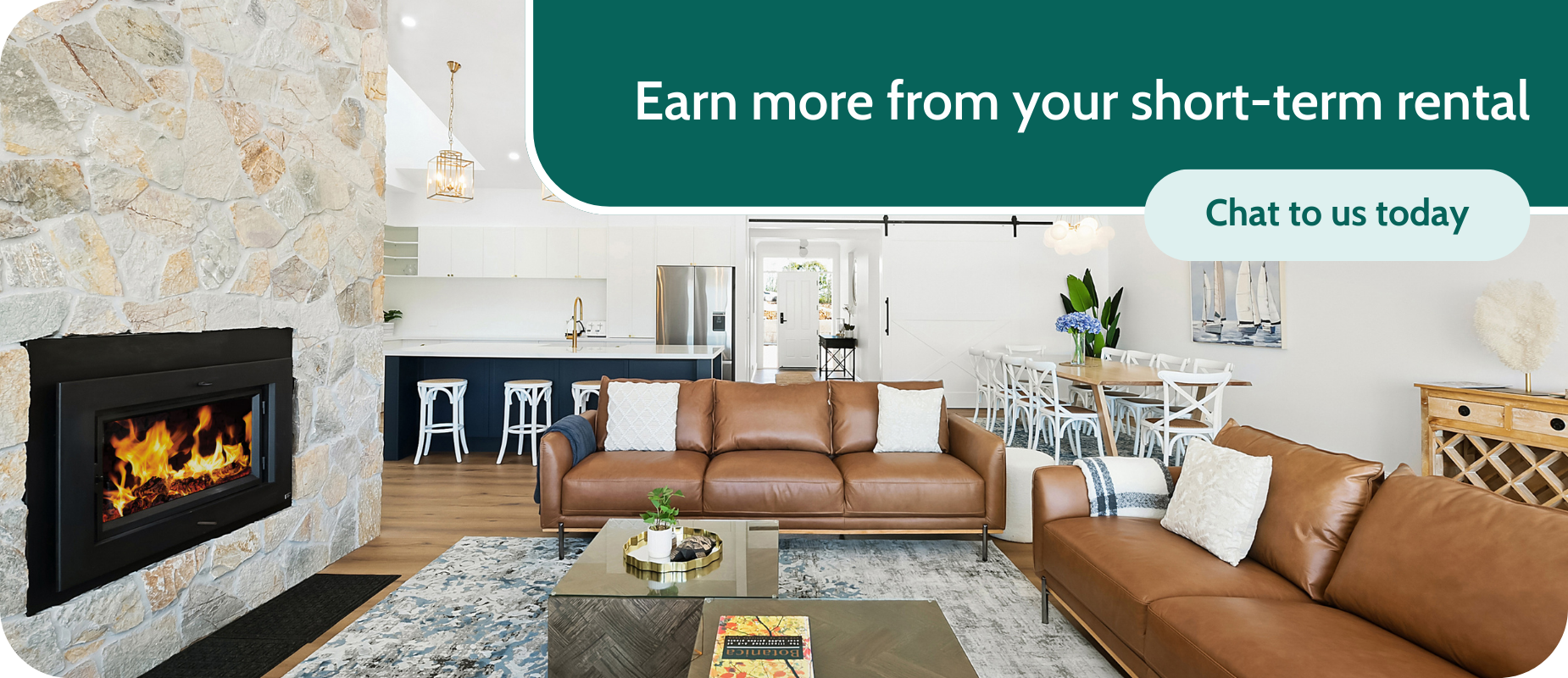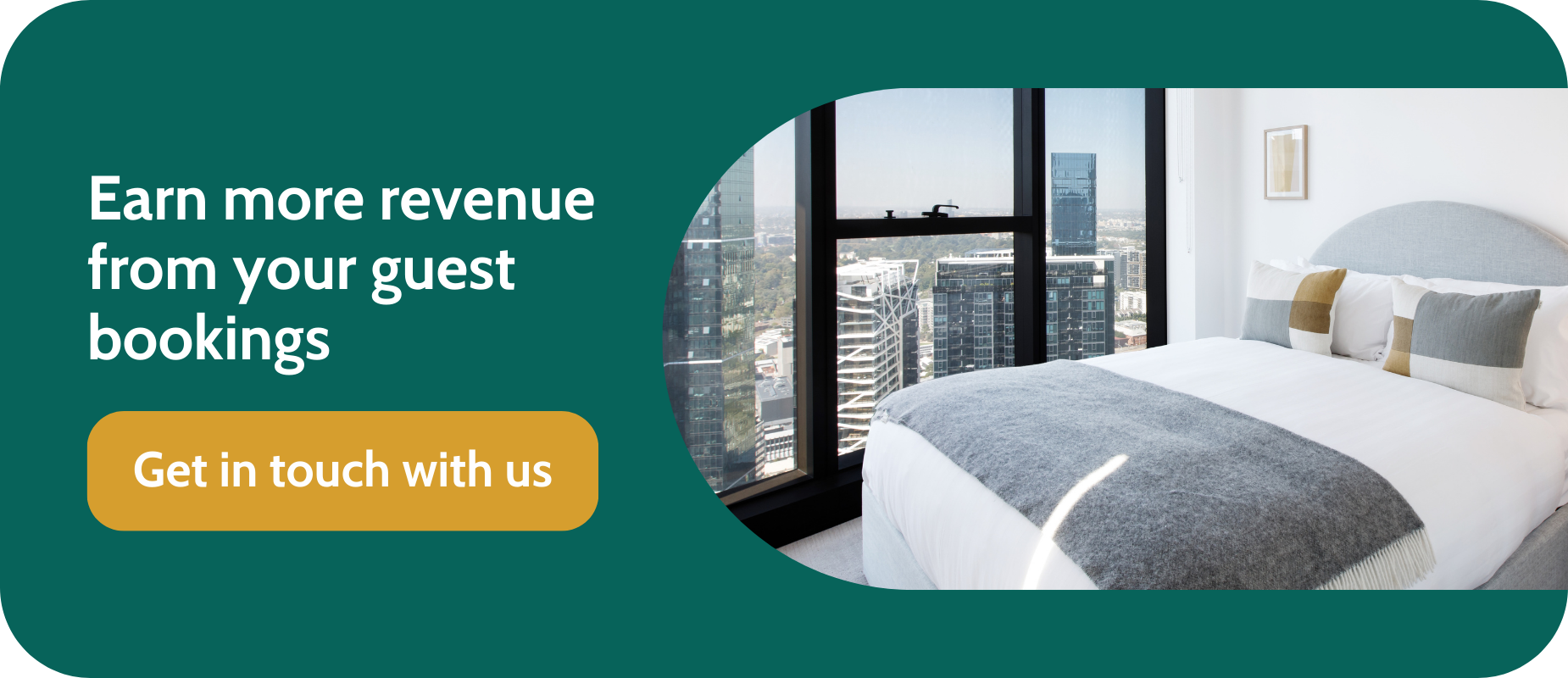Table of Contents
Getting started with Airbnb in Australia can be an exciting way to generate extra income. With more Australians travelling domestically and international tourists visiting or returning, the short-term rental (STR) market remains strong in 2025.
But here’s the truth: hosting isn’t passive income. From navigating local rules to furnishing your property, creating listings, and managing guests, short-term rental management and running an Airbnb take time and effort. That’s why many successful homeowners work with an Airbnb set-up service like Hometime, so their property isn’t just listed but optimised for long-term success.
This guide will walk you through everything you need to know about setting up an Airbnb in Australia, including costs, timelines, and the pros and cons of self-management versus professional help.
1. Understand Airbnb rules and regulations
Before anything else, you’ll need to check if your property can legally be used as a short-term rental in Australia.
Regulations vary by state and even by local council. Some areas allow STRs without restriction, while others require permits, caps on annual nights, or compliance with strict fire safety standards.
Key considerations include:
- Licensing and registration: If you’re unsure how to register for Airbnb in Australia, the process involves applying for a local STR licence. This differs by state, so check your local council’s website.
- Taxation: Airbnb income in Australia is taxable and must be reported to the Australian Taxation Office (ATO). You may also be eligible to claim deductions for expenses such as cleaning, insurance, utilities, and supplies directly related to hosting. Hosts only require an Australian Business Number (ABN) if they are operating a rental property business at a significant scale with heavy personal involvement. Investment homeowners can declare the income on their personal tax return. For up-to-date details and examples, see the ATO’s guidance on renting out your home or investment property.
- Insurance: Standard home insurance rarely covers STRs. Airbnb provides AirCover, but most hosts also take out specialised short-term rental insurance for peace of mind. Read our blog for more information on different types of short-term rental insurance.
- Safety standards: Check your local council’s website for current regulations concerning smoke alarms, fire extinguishers, evacuation plans, and regular inspections.
Nervous about maintaining property compliance? An Airbnb manager like Hometime ensures properties are onboarded in line with local laws and safety requirements, so you don’t have to lift a finger.
2. Research your market
A successful Airbnb isn’t just about listing a property; it’s about positioning it correctly.
Ask yourself:
- What makes my location special?
Melbourne remains a short-term rental powerhouse, with over 12,500 active listings and 76% occupancy in 2025. The city’s packed calendar of cultural festivals, concerts, and sporting events, from the Australian Open and AFL season to world-class theatre and food festivals, helps ensure steady demand throughout the year.
Coastal destinations like the Gold Coast averaged 70% occupancy, with demand peaking during summer holidays. Its beaches, nightlife, and lifestyle appeal, combined with major events and festivals, make it one of the most sought-after year-round destinations for both domestic and international guests.
- Who is my target guest?
Urban markets such as Sydney and Melbourne typically attract business travellers, professionals attending conferences, and event-goers seeking city convenience. Sydney alone welcomed 3.6 million international visitors in the year to March 2025, with strong demand from both corporate and leisure segments.
In contrast, regional towns like Hobart, with 3,000 active listings and a steady 70% occupancy, appeal to families, couples, and travellers chasing unique cultural and outdoor experiences. Properties in these markets often perform well with guests looking for longer, more immersive stays.
- When is demand highest?
Seasonal peaks and local events significantly shape earnings potential. In Adelaide, Airbnb occupancy reached 72% and spiked during the AFL Gather Round, which alone generated $113.9 million for the local economy. Sydney’s nightly rates soar on New Year’s Eve, while Brisbane benefits from the NRL Magic Round and will see sustained growth leading up to the 2032 Olympics.
For homeowners, aligning pricing to these patterns is key. During high-demand events, rates can be pushed up to maximise returns, while quieter periods call for more competitive pricing to attract bookings. This flexibility helps smooth earnings across the year and ensures consistent performance.
To dive deeper into how your market is performing, read our blog on Can I make money from Airbnb and STRs in 2025?
3. Furnish and prepare your property
One of the biggest upfront tasks is getting your home guest-ready. Furnishing costs are difficult to pin down because every property is different, and it depends on whether you’re starting from scratch, upgrading partially furnished rooms, or replacing outdated short-term rental or Airbnb furniture.
Here are three common approaches and the expected timeframe for each:
- DIY furnishing
- Cheapest option if you’re savvy with big-box retailers or second-hand marketplaces.
- Takes the longest; you’ll need to source, buy, deliver, assemble, and style everything yourself, which can take anywhere from weeks to months, depending on your schedule.
- Works best for hands-on hosts with an eye for design.
- Partner with a professional styling company
- Companies like Home Remedy can fully furnish and style properties with around a one-month lead time to book the service.
- Requires more budget (often $25K+), though payment plans may be available.
- Offers high-impact results with a quick turnaround and can be installed in a matter of days once your booking date arrives.
- Work with a professional property manager like Hometime
- Many of Hometime’s local hosts can provide styling services.
- They often access trade pricing from trusted suppliers like A. H. Beard, making it cost-effective.
- Best if you want a professionally styled home without the price tag of an external company.
Please watch the video below to learn the benefits of outsourcing your property styling to a professional property manager like Hometime:
Essential furnishings and amenities:
- Comfortable beds with high-quality linen.
- A well-equipped kitchen with pots, pans, and basic appliances.
- Fast, reliable Wi-Fi (a non-negotiable for remote workers).
- Practical extras: smart TV, coffee machine, USB chargers, heating/cooling.
- Optional but appealing touches: pet-friendly set-up, secure parking, outdoor space, and a designated desk to accommodate remote workers and domestic travellers.
Pro tip: Use Hometime’s Airbnb set-up checklist to make sure you don’t miss a thing.
4. Create a standout listing
Your listing is your digital storefront. A stand-out Airbnb listing should capture attention and give guests confidence to book.
- Professional photography and styling: The upfront cost of professional photos is worth the investment. Airbnb data shows listings with high-quality images earn up to 20% more bookings than other listings in their area. A hero shot (your cover photo) is critical to catch attention in search results.
- Copywriting: Write your description as if you’re showing a friend around. Highlight unique features (“sunset views from the balcony” or “dedicated home office”), be clear about amenities, and update your listing regularly.
- Pricing: Pricing isn’t static. If you’re unsure how to price your Airbnb, you’ll need to:
- benchmark against similar properties in your area,
- adjust for seasonality and local events,
- factor in costs like cleaning, maintenance, and Airbnb’s service fee, and
- consider using dynamic short-term pricing tools to automatically update night rates.like Popular options include: Airbnb's Smart Pricing, Vrbo's Rate Automation, PriceLabs, or AirDNA
Hometime’s specialised Revenue Management team combines these tools with real-time data to optimise prices, helping owners adapt to market shifts without having to do a thing.

5. Manage guest communication
Quick, friendly communication is key to securing bookings and keeping guests happy.
Expect to handle:
- enquiries before booking,
- arrival details and self-check-in instructions,
- questions during the stay, and
- follow-ups and review requests.
This can become a monotonous daily task, especially if managing your STR is a side gig. Many hosts automate responses for common questions, but personalisation goes a long way.
Hometime’s on-the-ground local hosts handle guest communication on your behalf, giving guests a great experience while saving you time. By outsourcing to a property manager like Hometime, you can trust that we take the appropriate measures to vet guests on our various booking platforms, including our direct booking site, Booking.com, Airbnb and Vrbo’s expanded distribution network, including Trivago, Expedia and Stayz, to help prevent any issues down the line.
6. Plan for cleaning and maintenance
STR properties need more frequent cleaning and upkeep than long-term rentals. You’ll need to coordinate:
- professional cleaning between every stay,
- regular restocking of essentials like toiletries and coffee, and
- ongoing maintenance (gardening, pool care, small repairs).
Over time, this adds up in both time and money.
Hometime’s local hosts manage our trusted network of professional cleaners and tradespeople, so your property stays guest-ready without you having to lift a finger.
7. Airbnb set-up costs
So, how much does it cost to set up an Airbnb in Australia?
It depends on the property, but here’s what to expect:
Upfront onboarding costs:
- Initial professional clean
- Professional Airbnb photography
- Lockbox or smart lock installation
- Listing creation fee
Typical onboarding costs range from $600–$1,000 at Hometime. Ongoing extra costs may also be applicable.
Additional costs to factor in:
- Furnishing and styling (highly variable, depending on approach).
- Ongoing expenses such as insurance, internet, utilities, gardening, pool cleaning, or rubbish services.
8. Consider self-set-up vs professional set-up
Many first-time hosts start by self-managing. It can work if:
- you live close to the property,
- you have flexible time to handle guest messages, turnovers, and issues, and
- you enjoy the operational side of hosting.
But if your goal is to maximise income and minimise stress, professional management offers clear benefits.
With Hometime, you get:
- Compliance and onboarding handled for you.
- Access to trade discounts on furnishings.
- Professional photography, property styling and optimised listings.
- Dynamic pricing and revenue management.
- Guest communication, cleaning, and maintenance coordinated locally.
- Regular reporting and insights on your property’s performance.
In short, you still own and control the property, but you don’t have to manage the day-to-day work.
Launch your Airbnb the easy way with Hometime
Launching an Airbnb is more than just creating a listing; it’s about setting up for long-term success. From market research and furnishings to pricing and guest experience, every step matters.
At Hometime, we provide Airbnb set-up help and full-service management tailored to your property. Whether you want guidance with styling or end-to-end support, we’ll help you create a short-term rental that stands out and delivers reliable returns.
Get help with your Airbnb set up today and discover how Hometime can make hosting hassle-free:

